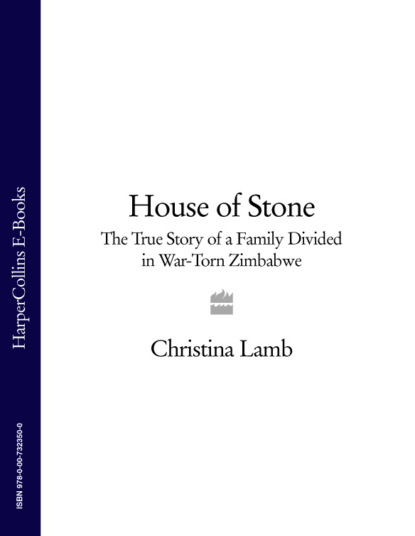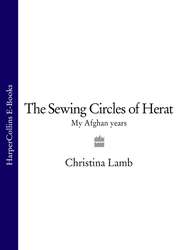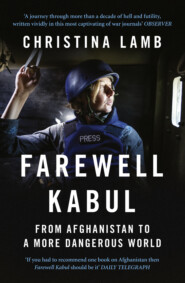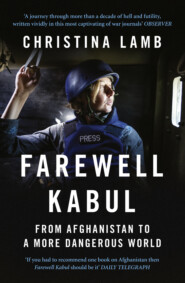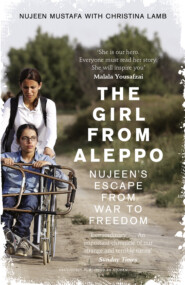По всем вопросам обращайтесь на: info@litportal.ru
(©) 2003-2024.
✖
House of Stone: The True Story of a Family Divided in War-Torn Zimbabwe
Настройки чтения
Размер шрифта
Высота строк
Поля
I admired the nurses' uniforms, how smart they were, and saving lives, and wanted to look like them and also because being a nurse or a teacher was something very special in the community But she knew it was impossible because her body was turning into that of a woman and her parents would soon take her out of school. It was different for boys. Boys were so precious, more precious than girls, we were useless in their eyes. Her young brother Tatiwa who had been born after the death of her previous two brothers was even more precious because he was the only son to survive. He would get all the land and as much schooling as the family could afford even though he was dull and slow at learning.
As for Aqui, she might have been the brightest girl in her class but she would not go to secondary school because by the age of thirteen a girl was supposed to be married. The idea of a girl's education was just for you to be able to read the note asking for your hand, then you were fine.
At that time there were only about 150 secondary schools in the whole country and few black children did more than six years' education. But Aqui loved school, particularly English and geography. I did not want to marry one of the silly boys in the village or, worse, an old man who had lost his wife and wouldpay good lobola (#litres_trial_promo) [bride price]. In times of drought, when the rivers and wells dried up, the land shimmered with heat, and people had nothing to eat but the small yellow fruits that baboons ate, families often sold their daughters to such men, some such Mr Banana, as she thought of them, who had built up good stores of crops.
I begged the missionaries to let me stay on at school with the boysbut I knew my father would never agree. Her mother had not gone to school at all but she could read a little and it was clear to Aqui that she did most of the work. My father, like all the men, was just talking, talking. It was my mother who walked to the well every morning when the sun came up, a pot on her head to fetch water for tea; she who took the animals to the stand; planted and weeded the crops; mended our clothes and cooked the food. In the dry season she grew all sorts of vegetables-tomatoes, cabbages, onions and rapeseed for relish with the sadza. In the rainy season she grew maize, pumpkins and groundnuts.
Aqui's father worked as a contractor putting up wire fences on the big white farms around Chivhu, but the jobs came few and far between. I loved it best when he went hunting with his catapult and knobkerry and would bring back doves or guinea fowl or sometimes even a duiker which we would eat in thick rich gravy with the sadza. Then our bellies would be full and he would tell stories and life had never seemed so good.
But those days seemed long ago. Recently she had heard him and her mother arguing about her school fees and the cost of the new uniform she needed as her body started sprouting in all directions. ‘No man is going to want a wife with so much knowledge in her head,’ he pronounced, and the beer-drinkers enjoying some Seven Day in the yard all nodded agreement.
The pressure to get married beat like a drum on her temples until sometimes she thought her head would explode. I wished I was like the other girls in the village who just wanted to find a man to look after them, then life would be easier. Most of the time I could just busy myself with tasks and not think beyond. But then I remembered the books I had read at school and the nurses I had seen and I knew there was more out there than Zhakata's Kraal.
She hated passing the Apostolics gathered for one of their sessions, their white robes flapping around. I wasn't scared of them any more, but if they saw me one of them would point a finger and declare that I should marry this Mr Banana or that Mr Pumpkin.
At the well or washing clothes in the river, she noticed women hushing their voices as she approached and guessed they had been discussing her marriage prospects. Sometimes one of them made pointed pronouncements like, ‘An unmarried woman is a troubled woman.’ At the New Year's dancing which always took place after a small portion of each crop had been left for the spirits and the babies born that year had been blessed, a wealthy widower from the next village had tried to grab her hand. So old was he that skin hung in webs from his arms and it was all Aqui could do not to curl up her lip in revulsion. But he had cows and goats and a storeroom of maize and told her he would give her the best hut in the village and take her on the bus to Chivhu to buy a shop dress.
If she married him, her father would receive a hefty lobola of several cows. There was a proverb in the village that ‘a son-in-law is like a fruit tree; one never finishes eating from it’. I knew as the eldest I should help my family and marry a man like that with stocks for bad times, but it did not seem fair. Her only hope was if he shared the same totem as her, the animal spirit which all Mashona are given at birth as a way of safeguarding against incest. Mine was impala like my father because in Shona society men are more powerful than women so the children always take the totem of the father. It would be completely taboo for me to marry another impala.
Even Aqui's mother, who she had thought was on her side, had started saying that now she was twelve her eldest daughter should be taking more care of her appearance. One day she sat Aqui down and smeared her hair with a paste made of water and ashes from burning the dry bark of the mutsvedzabeni tree to try and tame its frizziness. I was quite sure Nehanda never did such things.
Aqui wondered about appealing to the headmaster of her school to see if there was some kind of scholarship that would let her study to be a nurse. She had always had glowing reports, which she read out to her mother, and she knew he liked her. At a sports day for schools in the area they had camped on the field of another school, St Judes, because it was too far to get back to their homes. While she and some friends were sitting round the fire they had made, a boy had come running with a message that the headmaster was calling for her. I went to him, he was standing and I knelt down because we were always taught to kneel to big people. He lunged at me and started groping. Fortunately he was so inebriated that he could hardly stand and she had managed to run away. When she got back to her friends the fire had gone out and they were already sleeping in their blankets. She huddled inside hers and shivered. I didn't sleep all night.
Under the tree, a light rustling disturbed her reverie and she watched a chameleon pause in the wind and lift its head before scuttling away. The sun had already disappeared behind the Daramombe Mountains and Aqui realized she should be moving the cattle back to their pen before the wild animals came out and she was scolded for dreaming again. As she hurried back, flicking the cows' haunches with a large twig, darkness fell and seemed to grow thick and black around her until the moon took pity and showed half its face to light her path.
4 Train to Salisbury, 1974 (#ulink_e8f4e04e-1344-57b0-b475-4990174a35ae)
‘LET ME, LET ME!’ The white boys on the train took turns fat holding the lighter flame to the pennies until they were burning hot, then placed them ready on the window ledge.
Outside the window the countryside from Umtali to Salisbury flashed by, hills and valleys, grass and streams, and strange balancing rocks that defied all notion of gravity. Unique to that part of southern Africa, the granite boulders strewn about the landscape looked like Easter Island figures tumbled on their heads by a mischievous giant. White Rhodesians often referred to their homeland as God's Own Country, and this part was the most beautiful of all.
On the racks above the seats were stacked the boys' straw boaters and black tin trunks with their surnames stencilled in white above the words ‘Prince Edward School, Salisbury’.
There was a shrieking whistle and the train shuddered to a halt at Marandellas station. As usual the platform was packed with natives hoping to sell sodas and biscuits. To Nigel, the crowd of women in colourful prints resembled a cloud of butterflies that parted as the train approached. Most rushed to the whites-only carriages in the front, urgently pressing their wares and black faces against glass panes etched with the words Rhodesian Railways. The schoolboys, smart in their maroon blazers, white shirts and maroon ties, hair cut into fresh pudding bowls by heartless mothers, stared out at the dusty children and strangely humped women with babies strapped to their backs. Then one of them wound down the windows a little to toss out the scalding pennies. They laughed uproariously as the black children jostled each other, hands outstretched, only to drop the coins in wide-eyed agony.
‘Works every time!’ shouted Nigel. ‘The piccanins (#litres_trial_promo) are so stupid.’
‘Have you heard?’ asked Charlie Tibbets. ‘They are talking about having munts at our school.’
‘No!’
‘Ja, Freddie Wilderkamp's dad is a governor and he told me.’
‘Ach, those munts have a hang of a smell. They don't wash, man. Imagine having them in the same dormitory.’
‘They don't even know how to use a bog. I heard the ones at St Georges stand on the seats!’
‘Imagine getting one of them as your fag!’
They all fell silent contemplating this prospect as the train chugged on its way. Occasionally it stopped at farms to leave mail or collect churns of milk and boys in similar school blazers who would clamber aboard with a cheery ‘Howzit?’
Nigel watched as a small black boy in torn red shorts held up with a pin jumped on clutching a plastic container to fill with water from one of the train's taps, then scampered off with a delighted smile. Outside a handful of dove-white clouds chased each other across the wide blue sky and one of his friends mimicked taking aim and pulling a trigger with his fingers.
I guess we were thinking about the munts we had on our farms, recalled Nigel, how they smelled and stole things and how our parents always said the black man couldn't be trusted. We knew that blacks were way behind in civilization.
Just before the previous election in 1970 in which the Rhodesian Front had won every single seat for the second time since declaring UDI, Smith told a rally: ‘Sixty years ago Africans here were uncivilized savages, walking around in skins. They have made tremendous progress but they have an awful long way to go.’
White boys like Nigel talked of the black population as ‘they’ and thought it not at all unreasonable that they should be barred from white hospitals, schools, bars, swimming pools, restaurants and shops or from voting.* (#litres_trial_promo) After all, Smith described them as ‘the happiest blacks in the world’. Besides, these were people who did things like leaving a tractor and trailer on a main road with no lights at night, which had led to his brother's tragic death.
Growing up in Rhodesia it was so easy to be drawn into generalizations. When you have all these incidents at the farm, endless theft and betrayals by servants, you have one or two ways of going. You can either rationalize and say, ‘Well, that would happen with any race,’ or say, ‘No, they're just an inferior breed and what do you expect?’
None of us could imagine them in our school Prince Edward was one of the oldest and most prestigious schools in Rhodesia. Founded as Salisbury Public School in the early days of the Pioneers back in 1898, it was renamed after the Prince of Wales who visited Rhodesia in 1925, and even today the school prospectus states that it ‘seeks to build balanced gentlemen’. The flag fluttering over the red-brick tower of the main building bore the school crest of a lion and a sable holding up a shield on which was the three-feathered coronet of the Prince of Wales. The lion carried a flag emblazoned with the English Tudor rose and both animals rested on a grassy knoll decorated with a Tudor rose, the African flame lily and the Welsh leek. Underneath was the Latin motto Tot facienda parum factum—So much to do, so little done, a translation of Rhodes's weary words on his deathbed in 1902.
The school was divided into eight houses named after Pioneers and heroes of the colonial era including Jameson, after Leander Starr Jameson, first administrator of the British South African Company; Baines, after Thomas Baines, the explorer; Selous, for Frederick Selous, the adventurer; and Moffat, for John Moffat, the British government emissary who first persuaded Lobengula to keep out the Boers. Nigel was in Rhodes House, where the initiation process included stealing fruit from the neighbouring convent and being woken in the middle of winter at 2 a.m. to swim in the pool and do a cross-country run. I thought it built up camaraderie but then one year a boy died doing it because he had a weak heart that no one knew about.
Apart from extensive rugby and cricket fields, the school had its own observatory and memorial chapel funded by the donations of old pupils. Nigel had managed to find a hiding place at the back upstairs and would sleep all the way through Sunday service. Latin and Greek were key parts of the Prince Edward curriculum and there was a set of rules such as always wearing a tie inside-maroon with the three feathers or green-striped for prefects-but never a cap. Any violations were punished with a set of cuts, beatings with a cane, sometimes six at a time, which left the victim bruised black and scarlet although of course no self-respecting boy would allow himself to cry.
The school day began somewhat brutally with a junior blowing a bugle at 6 a.m. Nigel was fagging for one of the prefects, Philip Nicholas, so had to get up even earlier to polish his shoes, run his bath and carry his books. Inspection and roll call were at 6.30 a.m. Everyone then filed over to the main school building for morning assembly which started with a rousing chorus of the school song. This opened with the lines:
When the lion roared of oldAnd the sable tossed his crest
It went on to become increasingly martial with verses such as:
When we lay aside the penAnd abandon bat and ballWe will acquit ourselves like menAnswering our country's call
Under Rhodesian law, no government school was permitted to have more than 6 per cent blacks, and Prince Edward had never admitted black students. But it was not the effect on traditions that concerned Nigel-Prince Edward was the country's top sporting school and he was worried about the impact a black presence might have on the performance of their teams. I lived for sport-squashy cricket, rugby. Although he was small for his age, within days of arriving the eleven-year-old Nigel had beaten the school tennis and squash champions and by the following year he was playing first-team cricket.
Their main rival school, St Georges, had black boys and because of that their teams were not allowed to play away games. Some schools refused to play them at all. I was really worried that would happen to us too. Also I dreaded the idea of being in a rugbyscrum with an African. I thought they were dirty and would smell. Peterhouse School used to have black guys and when we went to play against them we used to be very reluctant to eat off their plates because they seemed greasy and we thought it was because blacks had been eating off them.
White Rhodesia was an outdoor society where sport was very much part of life and enormous value was placed on sporting achievements. The first cricket pitch was laid by the Pioneers in Salisbury in 1891, as early a priority as building a school or hospital. At Prince Edward, schooldays started with a crosscountry run and there was no greater honour than being in the rugby first fifteen. Most of the national sports teams had ex-PE boys, and when Nigel joined the school, both Duncan Fletcher, the Zimbabwe cricket captain who went on to coach England to win the Ashes, and John Bredenkamp, the rugby captain (later better known as an arms dealer and one of Britain's richest men), were Old Hararians, as alumni were known. All other schools feared playing Prince Edward, said Nigel. Even St Georges boys spent most of their time running away from Prince Edward men.
The few black boys who managed to get places at white schools found life almost intolerable. James Mushore was one of the first in the 1970s, a scholarship boy at St Georges who went on to co-found Zimbabwe's largest merchant bank, NMB. ‘I had a terrible time,’ he said. ‘The white boys did something called “ball brushing,” which was pulling down my pants and painting my balls with bootblack. But worst of all was “bog washing”. There was one boy in particular who would defecate in the toilet, leave his faeces there, then force my head down into the bowl and flush it over me.’
When James won a nationwide spelling bee, his parents were not allowed in the hall to watch the competition and had been forced to sit outside in the car park waiting for him to come and tell them the result. Afterwards, he watched the mother of a white boy slap the cheek of her son, the runner-up, and loudly demand, ‘How could you let a kaffir beat you?’
Nigel admits he would have shared that mother's feelings. I clearly remember when I was at Prince Edward that there was an article in the newspaper where some American scientist had proven that blacks were w per cent more stupid than whites and they didn't have the same brain capacity and I remember us discussing how they must have been further down the evolutionary scale. This was a very politically correct view then; I suppose it sort of justified the behaviour.
At school they studied ‘Builders of Rhodesia’-Rhodes, Rudd, Jameson and Alfred Beit, the diamond and gold magnate-and were left under the impression that before the Pioneers arrived the country was a no man's land. Nigel had heard adults tell the story of the border between Rhodesia and Portuguese East Africa being decided by the toss of a die. Every white schoolboy had been taught the story of the last stand of Allan Wilson's patrol who died so bravely on the banks of the Shangani river as they were outnumbered by Lobengula's hordes. When they ran out of bullets they started singing ‘God Save the Queen until one by one they all fell. In fact what Nigel had learnt about as ‘a glorious sacrifice in the name of founding the country’ had no factual basis as no survivor lived to tell the tale. The deaths of the 34 men were probably caused by a reckless blunder during Jameson's barbaric war on the Ndebele in 1893.
The war ended with Lobengula telling his people, ‘Now here are your masters coming … You will have to pull and shove wagons but under me you never did this kind of thing … the white people are coming now, I didn't want to fight with them.’ The King apparently then swallowed poison after learning that the last of his impis (#litres_trial_promo) had surrendered, though other reports suggest that he fled across the border. Inkosi yanyamalala, the Ndebele say, ‘The King has vanished.’
But Nigel had never heard of this, nor of Rhodes's tricking of Lobengula that had led to the creation of Rhodesia. Even when I left school all I knew was that Lobengula was fat and primitive and that's all.
For us the history of Rhodesia started with the arrival of whites to civilize warring kaffir tribes. At school I learned all about the two world wars and the threat of Communist advancement but I never knew anything about the Shona or Ndebele people or any local language or culture. We didn't think they had a culture. I knew how to say ‘mangwanani in Shona, which means ‘good morning,’ and nothing else. I knew nothing about how blacks lived.
Ian Smith's description in his memoirs typified the Rhodesian view. On the Pioneers’ imposition of hut tax on the natives, he wrote: ‘They [the natives] were happy to have the opportunity to work and for the first time in their lives, earn money which enabled them to join in the excitement of this new adventure of purchasing and selling-something they had never previously known.’ As for the white settlers taking the best land, he explained: ‘Because of the primitive agricultural implements used by the black people which were wooden as opposed to the iron used by the white man, they were concentrated on the light sandy soils which they found easier to work.’
History had been rewritten to fit a white notion of Rhodesia and it did not stop with politics. Revisionism also turned to cultural artefacts. Great Zimbabwe appeared on Rhodesian maps as the Zimbabwe Ruins, the remains of a white empire in Africa built by Phoenicians, Greeks or Egyptians, because the Rhodesian government did not want to believe that black Africans could have built such a place. In the 1960s the Smith regime even commissioned a history promoting that view despite the complete lack of supporting evidence. Postcards were sold showing it as the possible palace of the Queen of Sheba, the view propounded by the first Europeans to come across it.





